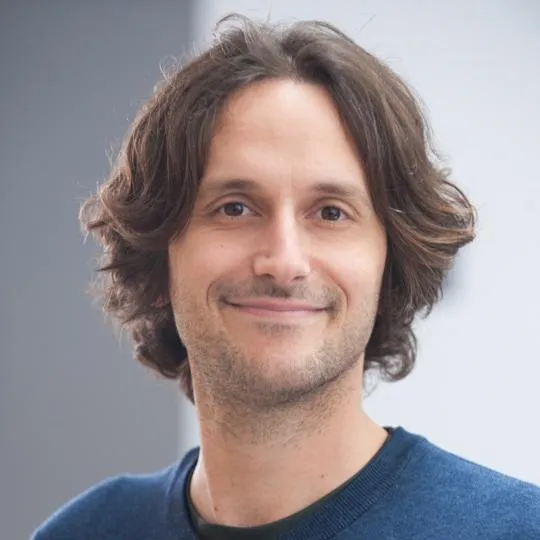This study, which is by far the largest clinical trial on the use of psilocybin for treatment-resistant depression to date, demonstrated that a single 25 mg dose of psilocybin reduces the severity of participants’ symptoms in comparison to a 1 mg control dose.
Dr James Rucker, Senior Clinical Lecturer and Co-Lead Psychoactive Trials Group at IoPPN at King’s and Consultant Psychiatrist, South London and Maudsley NHS Foundation Trust
03 November 2022
Largest trial to date shows that psilocybin reduces depression symptoms
A new multicentre clinical trial led by COMPASS Pathways across 22 international sites, including the Institute of Psychiatry, Psychology & Neuroscience (IoPPN) at King’s College London and South London and Maudsley NHS Foundation Trust, has found that a 25mg dose of psilocybin, alongside psychological support, had a significant impact in reducing symptoms of depression in participants with treatment-resistant depression.

Approximately 100 million people in the world suffer with treatment-resistant depression, which means they have not responded to at least two antidepressant treatments for their major depressive disorder.
The study, published in the New England Journal of Medicine, investigated the change in the severity of depression in participants with treatment-resistant depression over the course of 12 weeks following a single dose of psilocybin alongside psychological support. Researchers found that participants reported a greater reduction in levels of depression three weeks after taking a 25 mg dose of psilocybin, compared to those who took the lowest 1 mg dose.
Some adverse effects, such as headaches, nausea and thoughts around suicide, were reported across all groups.
The largest clinical trial to date
The phase 2b clinical trial was conducted at 22 sites in 10 countries across Europe (Czech Republic, Denmark, Germany, Ireland, the Netherlands, Portugal, Spain and the United Kingdom) and North America (Canada and the United States) between 1 March 2019 and 27 September 2021. 233 participants with treatment-resistant depression were allocated at random to receive one of a single 25 mg, 10 mg or 1 mg dose of psilocybin; with those who received the 1 mg dose acting as a control group. Neither the participants nor the researchers were aware which dose the participant had received.
Dr James Rucker, Co-Lead Psychoactive Trials Group at King's IoPPN and Consultant Psychiatrist at South London and Maudsley NHS Foundation Trust said: "Whilst many patients with mental health problems get better with available treatments, a subgroup of people do not even though they try many different forms of treatment. This is sometimes called ‘treatment resistance’. This can lead to a variety of other problems that seriously impact on patients and the people around them. Treatment options are often limited and come with troublesome side effects or stigma. Therefore, new paradigms of treatment are needed and clinical research of new treatments is important. Psilocybin therapy may be a new paradigm of treatment, but this needs to be tested in clinical trials. We are doing this work at the Psychoactive Trials Group, and we deliver new and pioneering treatments in collaboration with our colleagues at the Maudsley Centre for Advanced Treatments."
Dr Rucker went on to say: "These findings are a positive step in the right direction. Our task now is to investigate psilocybin for treatment-resistant depression in larger trials with more participants, comparing it both to placebo and to established treatments."
"The publication of our COMP360 psilocybin therapy study in the most prestigious peer-reviewed medical journal in the world is a proud moment for everyone involved" said Dr Guy Goodwin, Chief Medical Officer, COMPASS Pathways. "We saw positive results in a particularly difficult to treat group of patients, and the highest dose of COMP360 psilocybin had the greatest impact on people’s depression. This suggests that COMP360 psilocybin has a true pharmacological effect, a finding that is critical for it to be recognised as a new treatment option in the future. We look forward to starting our phase 3 programme later this year, moving us closer to providing COMP360 psilocybin with psychological support for patients who desperately need it."
Investigating the effectiveness of psilocybin on treatment-resistant depression
All participants were assessed on the severity of their depressive symptoms the day before the psilocybin was administered, and follow up interviews were conducted on day two, and week one, three, six, nine, and 12.
Participants were given COMP360 psilocybin in specialised rooms designed to provide a nonclinical and calming atmosphere. The psychedelic effects lasted between six to eight hours, and during this time a therapist was in the room to provide psychological support. All therapists underwent a detailed training programme designed for the trial. It consisted of four components: an online learning platform, in-person training, clinical training, and ongoing individual mentoring and webinars. After the psychedelic effects were fully dissipated participants were able to return home.
Not only is this the largest trial investigating the use of psilocybin for treatment-resistant depression but it also involved designing and delivering one of the largest training programmes for therapists to provide psychological support alongside psilocybin in research settings. As part of the training programme, a therapy manual was developed to enable the standardisation of the psychological support across sites and therapists around the world.
Nadav Liam Modlin, Psychology and Psychotherapy Lead in Psychedelics at King's IoPPN
Liam Modlin continued: "The trial therefore also generated valuable insights into the non-pharmacological factors influencing outcomes in psilocybin therapy. To that end, possessing a greater understanding of these factors will contribute to treatment optimisation and therapist training, which will be highly valuable for future trials in this area."
Researchers found that participants who received the 25 mg dose of psilocybin experienced a greater reduction in depression scores than those who received the 1 mg control dose. There was no significant difference in the changes in depression between those who were given the 10 mg dose and the 1 mg and between those who were given the 25 mg and 10 mg dose.
Over the 12-week study period adverse effects, including headache, nausea and dizziness, occurred in 84 per cent of participants in the 25 mg group, 75 per cent in the 10 mg group and 72 per cent in the 1 mg group. Suicidal ideation and intentional self-injury were seen in all dose groups, as is common in treatment-resistant depression studies. Most cases occurred more than a week after the psilocybin session. There was no average worsening of suicidal ideation scores on the depression rating scale in any dose group.
The trial was designed and funded by COMPASS Pathways. It was conducted in collaboration with the Psychoactive Trials Group at the IoPPN and the Maudsley Advanced Treatment Service at South London and Maudsley NHS Foundation Trust
Centre for Mental Health Research and Innovation
In March 2022, the IoPPN, South London and Maudsley NHS Foundation Trust and COMPASS Pathways launched the Centre for Mental Health Research and Innovation to provide patient access to cutting edge research studies in multiple areas of high unmet need in mental health. It will accelerate research of emerging psychedelic therapies, support therapist training and certification, evaluate real-world evidence, and prototype digital technologies to enable personalised, predictive and preventative care models.
‘Single-Dose Psilocybin for a Treatment-Resistant Episode of Major Depression’ was published in the New England Journal of Medicine (DOI: 10.1056/NEJMoa2206443).
For more information, please contact Patrick O’Brien (Senior Media Officer).





